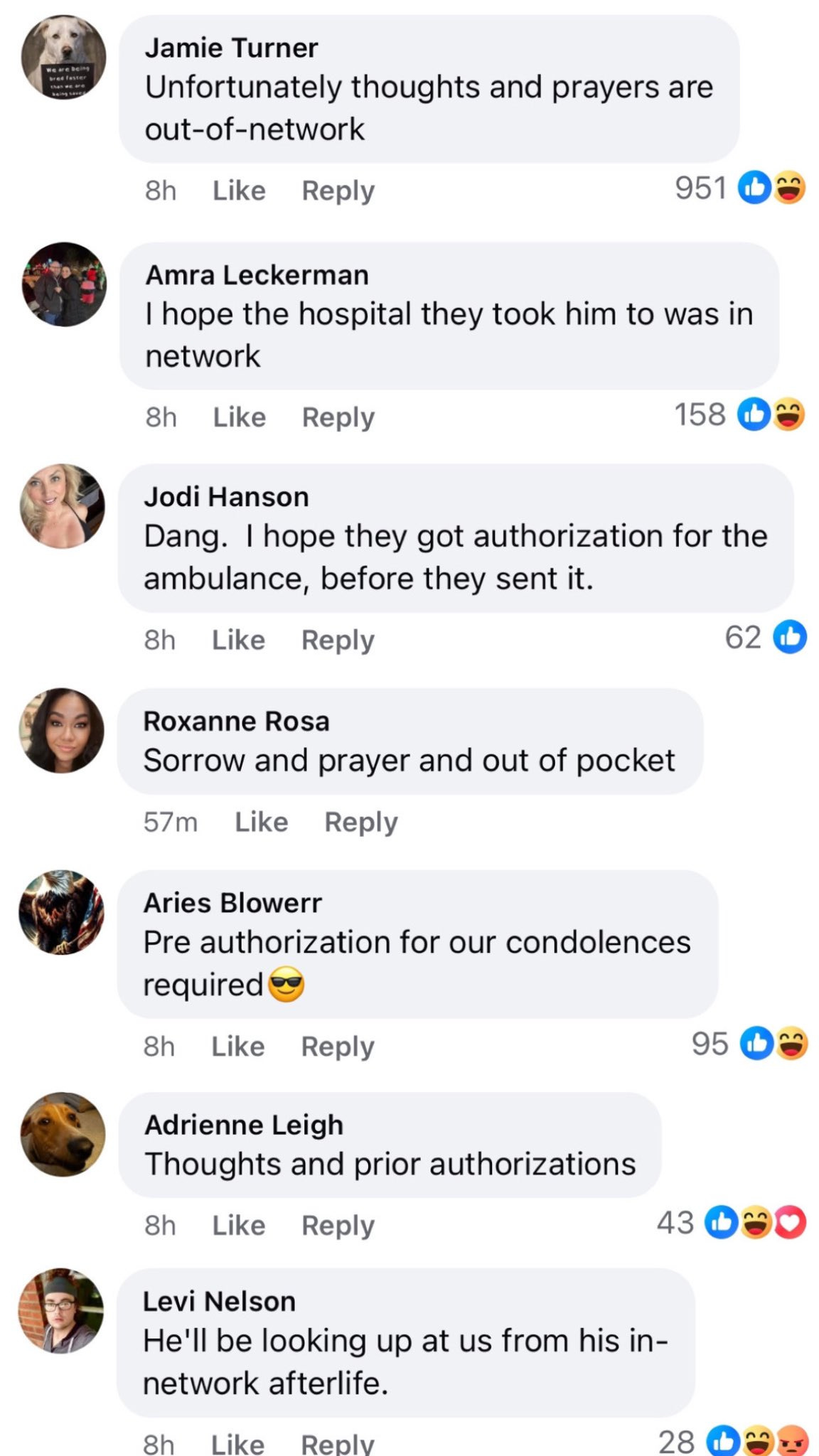A shot in the light
Violence has entered the healthcare chat
I’m fairly unsettled by the assassination of former UHC CEO Brian Thompson. As someone who has navigated the private health insurance system both as a patient and a provider, I understand the frustrations it creates.
I’ve dealt with coverage limits that kept me from filling prescriptions and watched patients struggle to pay out-of-pocket for treatments denied by prior authorization. Evidence of UnitedHealthcare’s denial practices has been well-documented by ProPublica, from patients with ulcerative colitis to those seeking mental health care.
We can all agree our country’s private health insurance system is deeply flawed. A lot of this comes down to the fact that it operates as a business that, like most industries, is driven to maximize profits. In a better system, financial incentives would align with delivering good healthcare outcomes and making care effective and accessible.
But Thompson’s death doesn’t feel like progress toward that change.
Thompson’s story is one of upward mobility, often described as the American dream. He rose from a small-town upbringing to lead the behemoth of the private health insurance industry. Some see this as the ascent of a villain, but it’s possible he succeeded by simply navigating the system’s rules effectively—not because he took any joy in depriving people of care.
So I’ve been struck by how many people seem to be rejoicing over his death:

All of this celebratory glee is hard to process—it’s disconcerting, even a little off-putting, and yet it says so much about how powerless people feel. And I do understand why people are so angry and so tired.
Health is deeply personal, maybe the most personal thing there is. Being unable to care for your own body—or that of a loved one—can feel like an assault on your dignity, self-respect, and basic human rights. And on top of that, being arbitrarily denied that care is downright infuriating. So much resentment has been simmering that, for some, murder in broad daylight feels like justice.
Assassinations in the U.S. are rare. They tend to target public officials, controversial figures, or cultural icons. A quick look at this list of assassinations in the United States shows no major CEOs being targeted in the last 50 years, which makes Thompson’s death particularly striking. His murder is drawing significant attention, but will it lead to meaningful change for the average American? Or will it serve merely as a release valve, briefly satisfying the disempowered?
There might be short-term concessions—like Anthem Blue Cross Blue Shield recently reversing a plan to cap anesthesia coverage—but will these temporary fixes pave the way for the long-term systemic change? Or will this act of violence instead give the broader health insurance industry a reason to double down, further hardening its defenses?
Targeted violence disrupts the usual rules of conduct—especially in business. Some might argue that UHC and other insurers broke the rules of human decency first by knowingly harming patients, but, morality aside, they can fall back on the shield of business practices, framing these harms as just the cost of doing business.
The assassin, however, has no such shield. Yes, many may sympathize with his motives (which remain unclear), but the fact is, he committed a crime. And criminals are rarely viewed as rational or credible. They’ll never have a seat at the table.
Being in the arena requires strength and a willingness to butt heads, but it doesn’t justify murder. If anything, violence gives systems a reason to dig in even deeper: If you’re willing to kill our leader, why should we ever engage with your grievances peacefully or earnestly?
Violence also flips the script, turning the other party—in this case, UHC—into the victim. And victims rarely feel compelled to change; as the aggrieved, they are allowed to retreat into a defensive mindset, shutting down the possibility of collaboration, creativity, or meaningful reform.
Violence may wedge open the doors, but it’s just as likely to crush the fingers—or limbs—of those trying to force their way through.
Some might not agree, but I see Brian Thompson’s death as a tragedy. He worked his way up and, by all accounts, treated those around him well. I feel for his family. His death is a stark reminder of just how broken the current system is and how far we still are from meaningful progress.
It leaves me thinking about the kind of change we need—change driven by sustained, intentional effort rather than the ill will embodied in and inspired by a single dramatic act.

